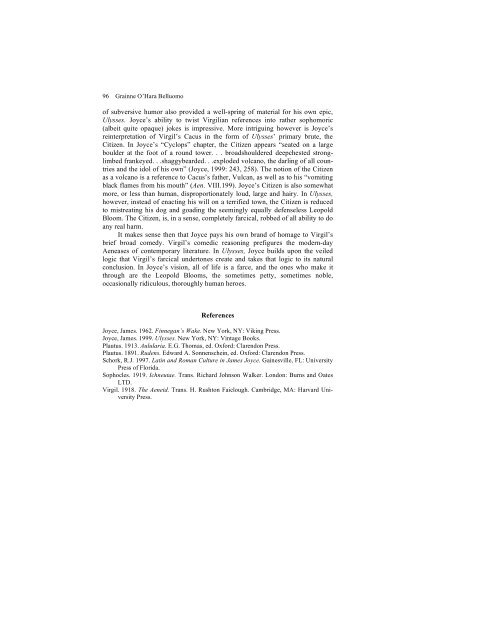Create successful ePaper yourself
Turn your PDF publications into a flip-book with our unique Google optimized e-Paper software.
96 Grainne O’Hara Belluomo<br />
of subversive humor also provided a well-spring of material for his own epic,<br />
Ulysses. Joyce’s ability to twist Virgilian references into rather sophomoric<br />
(albeit quite opaque) jokes is impressive. More intriguing however is Joyce’s<br />
reinterpretation of Virgil’s Cacus in the form of Ulysses’ primary brute, the<br />
Citizen. In Joyce’s “Cyclops” chapter, the Citizen appears “seated on a large<br />
boulder at the foot of a round tower. . . broadshouldered deepchested stronglimbed<br />
frankeyed. . .shaggybearded. . .exploded volcano, the darling of all countries<br />
and the idol of his own” (Joyce, <strong>19</strong>99: 243, 258). The notion of the Citizen<br />
as a volcano is a reference to Cacus’s father, Vulcan, as well as to his “vomiting<br />
black flames from his mouth” (Aen. VIII.<strong>19</strong>9). Joyce’s Citizen is also somewhat<br />
more, or less than human, disproportionately loud, large and hairy. In Ulysses,<br />
however, instead of enacting his will on a terrified town, the Citizen is reduced<br />
to mistreating his dog and goading the seemingly equally defenseless Leopold<br />
Bloom. The Citizen, is, in a sense, completely farcical, robbed of all ability to do<br />
any real harm.<br />
It makes sense then that Joyce pays his own brand of homage to Virgil’s<br />
brief broad comedy. Virgil’s comedic reasoning prefigures the modern-day<br />
Aeneases of contemporary literature. In Ulysses, Joyce builds upon the veiled<br />
logic that Virgil’s farcical undertones create and takes that logic to its natural<br />
conclusion. In Joyce’s vision, all of life is a farce, and the ones who make it<br />
through are the Leopold Blooms, the sometimes petty, sometimes noble,<br />
occasionally ridiculous, thoroughly human heroes.<br />
References<br />
Joyce, James. <strong>19</strong>62. Finnegan’s Wake. New York, NY: Viking Press.<br />
Joyce, James. <strong>19</strong>99. Ulysses. New York, NY: Vintage Books.<br />
Plautus. <strong>19</strong>13. Aulularia. E.G. Thomas, ed. Oxford: Clarendon Press.<br />
Plautus. 1891. Rudens. Edward A. Sonnenschein, ed. Oxford: Clarendon Press.<br />
Schork, R.J. <strong>19</strong>97. Latin and Roman Culture in James Joyce. Gainesville, FL: <strong>University</strong><br />
Press of Florida.<br />
Sophocles. <strong>19</strong><strong>19</strong>. Ichneutae. Trans. Richard Johnson Walker. London: Burns and Oates<br />
LTD.<br />
Virgil. <strong>19</strong>18. The Aeneid. Trans. H. Rushton Faiclough. Cambridge, MA: Harvard <strong>University</strong><br />
Press.

















